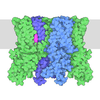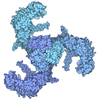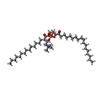[English] 日本語
 Yorodumi
Yorodumi- PDB-8fhh: Wildtype rabbit TRPV5 in nanodiscs in the presence of oleoyl coen... -
+ Open data
Open data
- Basic information
Basic information
| Entry | Database: PDB / ID: 8fhh | |||||||||
|---|---|---|---|---|---|---|---|---|---|---|
| Title | Wildtype rabbit TRPV5 in nanodiscs in the presence of oleoyl coenzyme A, Closed stated | |||||||||
 Components Components | Transient receptor potential cation channel subfamily V member 5 | |||||||||
 Keywords Keywords |  MEMBRANE PROTEIN / MEMBRANE PROTEIN /  TRPV5 / TRPV5 /  TRP channel / oleoyl coenzyme A / Closed state TRP channel / oleoyl coenzyme A / Closed state | |||||||||
| Function / homology |  Function and homology information Function and homology informationregulation of urine volume / calcium ion import across plasma membrane / calcium ion homeostasis / calcium ion transmembrane transport /  calcium channel activity / calcium ion transport / protein homotetramerization / calcium channel activity / calcium ion transport / protein homotetramerization /  calmodulin binding / apical plasma membrane / identical protein binding ...regulation of urine volume / calcium ion import across plasma membrane / calcium ion homeostasis / calcium ion transmembrane transport / calmodulin binding / apical plasma membrane / identical protein binding ...regulation of urine volume / calcium ion import across plasma membrane / calcium ion homeostasis / calcium ion transmembrane transport /  calcium channel activity / calcium ion transport / protein homotetramerization / calcium channel activity / calcium ion transport / protein homotetramerization /  calmodulin binding / apical plasma membrane / identical protein binding / calmodulin binding / apical plasma membrane / identical protein binding /  metal ion binding / metal ion binding /  plasma membrane plasma membraneSimilarity search - Function | |||||||||
| Biological species |   Oryctolagus cuniculus (rabbit) Oryctolagus cuniculus (rabbit) | |||||||||
| Method |  ELECTRON MICROSCOPY / ELECTRON MICROSCOPY /  single particle reconstruction / single particle reconstruction /  cryo EM / Resolution: 3.09 Å cryo EM / Resolution: 3.09 Å | |||||||||
 Authors Authors | De Jesus-Perez, J.J. / Moiseenkova-Bell, V.Y. | |||||||||
| Funding support |  United States, 2items United States, 2items
| |||||||||
 Citation Citation |  Journal: Nat Commun / Year: 2023 Journal: Nat Commun / Year: 2023Title: Structural basis of the activation of TRPV5 channels by long-chain acyl-Coenzyme-A. Authors: Bo-Hyun Lee / José J De Jesús Pérez / Vera Moiseenkova-Bell / Tibor Rohacs /   Abstract: Long-chain acyl-coenzyme A (LC-CoA) is a crucial metabolic intermediate that plays important cellular regulatory roles, including activation and inhibition of ion channels. The structural basis of ...Long-chain acyl-coenzyme A (LC-CoA) is a crucial metabolic intermediate that plays important cellular regulatory roles, including activation and inhibition of ion channels. The structural basis of ion channel regulation by LC-CoA is not known. Transient receptor potential vanilloid 5 and 6 (TRPV5 and TRPV6) are epithelial calcium-selective ion channels. Here, we demonstrate that LC-CoA activates TRPV5 and TRPV6 in inside-out patches, and both exogenously supplied and endogenously produced LC-CoA can substitute for the natural ligand phosphatidylinositol 4,5-bisphosphate (PI(4,5)P) in maintaining channel activity in intact cells. Utilizing cryo-electron microscopy, we determined the structure of LC-CoA-bound TRPV5, revealing an open configuration with LC-CoA occupying the same binding site as PI(4,5)P in previous studies. This is consistent with our finding that PI(4,5)P could not further activate the channels in the presence of LC-CoA. Our data provide molecular insights into ion channel regulation by a metabolic signaling molecule. | |||||||||
| History |
|
- Structure visualization
Structure visualization
| Structure viewer | Molecule:  Molmil Molmil Jmol/JSmol Jmol/JSmol |
|---|
- Downloads & links
Downloads & links
- Download
Download
| PDBx/mmCIF format |  8fhh.cif.gz 8fhh.cif.gz | 485.1 KB | Display |  PDBx/mmCIF format PDBx/mmCIF format |
|---|---|---|---|---|
| PDB format |  pdb8fhh.ent.gz pdb8fhh.ent.gz | 397.3 KB | Display |  PDB format PDB format |
| PDBx/mmJSON format |  8fhh.json.gz 8fhh.json.gz | Tree view |  PDBx/mmJSON format PDBx/mmJSON format | |
| Others |  Other downloads Other downloads |
-Validation report
| Arichive directory |  https://data.pdbj.org/pub/pdb/validation_reports/fh/8fhh https://data.pdbj.org/pub/pdb/validation_reports/fh/8fhh ftp://data.pdbj.org/pub/pdb/validation_reports/fh/8fhh ftp://data.pdbj.org/pub/pdb/validation_reports/fh/8fhh | HTTPS FTP |
|---|
-Related structure data
| Related structure data |  29085MC 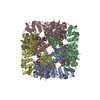 8ffoC 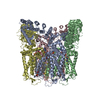 8fhiC M: map data used to model this data C: citing same article ( |
|---|---|
| Similar structure data | Similarity search - Function & homology  F&H Search F&H Search |
- Links
Links
- Assembly
Assembly
| Deposited unit | 
|
|---|---|
| 1 |
|
- Components
Components
| #1: Protein | Mass: 83784.586 Da / Num. of mol.: 4 Source method: isolated from a genetically manipulated source Source: (gene. exp.)   Oryctolagus cuniculus (rabbit) / Gene: Trpv5, Ecac1 / Production host: Oryctolagus cuniculus (rabbit) / Gene: Trpv5, Ecac1 / Production host:   Saccharomyces cerevisiae (brewer's yeast) / References: UniProt: Q9XSM3 Saccharomyces cerevisiae (brewer's yeast) / References: UniProt: Q9XSM3#2: Chemical | ChemComp-POV / (  POPC POPC#3: Chemical | ChemComp-ERG /  Ergosterol ErgosterolHas ligand of interest | Y | |
|---|
-Experimental details
-Experiment
| Experiment | Method:  ELECTRON MICROSCOPY ELECTRON MICROSCOPY |
|---|---|
| EM experiment | Aggregation state: PARTICLE / 3D reconstruction method:  single particle reconstruction single particle reconstruction |
- Sample preparation
Sample preparation
| Component | Name: Tetramer of wildtype rabbit TRPV5 in nanodiscs in the presence of oleoyl coenzyme A Type: COMPLEX / Entity ID: #1 / Source: RECOMBINANT |
|---|---|
| Molecular weight | Value: 0.33514 MDa / Experimental value: NO |
| Source (natural) | Organism:   Oryctolagus cuniculus (rabbit) Oryctolagus cuniculus (rabbit) |
| Source (recombinant) | Organism:   Saccharomyces cerevisiae (brewer's yeast) Saccharomyces cerevisiae (brewer's yeast) |
| Buffer solution | pH: 8 |
| Specimen | Conc.: 2.5 mg/ml / Embedding applied: NO / Shadowing applied: NO / Staining applied : NO / Vitrification applied : NO / Vitrification applied : YES : YES |
| Specimen support | Grid material: COPPER / Grid type: Quantifoil R1.2/1.3 |
Vitrification | Instrument: FEI VITROBOT MARK IV / Cryogen name: ETHANE / Humidity: 100 % / Chamber temperature: 277.15 K |
- Electron microscopy imaging
Electron microscopy imaging
| Experimental equipment |  Model: Titan Krios / Image courtesy: FEI Company |
|---|---|
| Microscopy | Model: FEI TITAN KRIOS |
| Electron gun | Electron source : :  FIELD EMISSION GUN / Accelerating voltage: 300 kV / Illumination mode: FLOOD BEAM FIELD EMISSION GUN / Accelerating voltage: 300 kV / Illumination mode: FLOOD BEAM |
| Electron lens | Mode: BRIGHT FIELD Bright-field microscopy / Nominal magnification: 105000 X / Nominal defocus max: 2500 nm / Nominal defocus min: 500 nm / Cs Bright-field microscopy / Nominal magnification: 105000 X / Nominal defocus max: 2500 nm / Nominal defocus min: 500 nm / Cs : 2.7 mm : 2.7 mm |
| Specimen holder | Specimen holder model: FEI TITAN KRIOS AUTOGRID HOLDER |
| Image recording | Electron dose: 42 e/Å2 / Film or detector model: GATAN K3 (6k x 4k) / Num. of real images: 11853 |
- Processing
Processing
| EM software |
| ||||||||||||||||||||||||||||||||||||
|---|---|---|---|---|---|---|---|---|---|---|---|---|---|---|---|---|---|---|---|---|---|---|---|---|---|---|---|---|---|---|---|---|---|---|---|---|---|
CTF correction | Type: PHASE FLIPPING AND AMPLITUDE CORRECTION | ||||||||||||||||||||||||||||||||||||
| Particle selection | Num. of particles selected: 2308671 | ||||||||||||||||||||||||||||||||||||
3D reconstruction | Resolution: 3.09 Å / Resolution method: FSC 0.143 CUT-OFF / Num. of particles: 60454 / Algorithm: FOURIER SPACE / Num. of class averages: 3 / Symmetry type: POINT | ||||||||||||||||||||||||||||||||||||
| Atomic model building | Protocol: FLEXIBLE FIT / Space: REAL |
 Movie
Movie Controller
Controller




 PDBj
PDBj